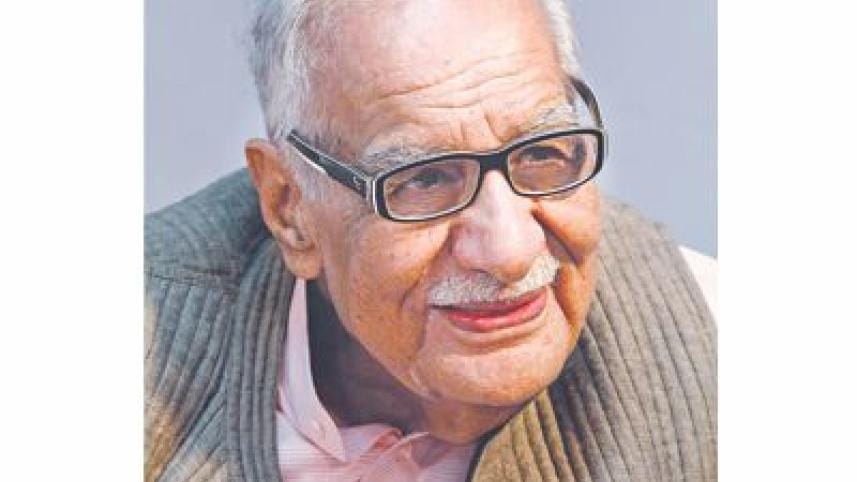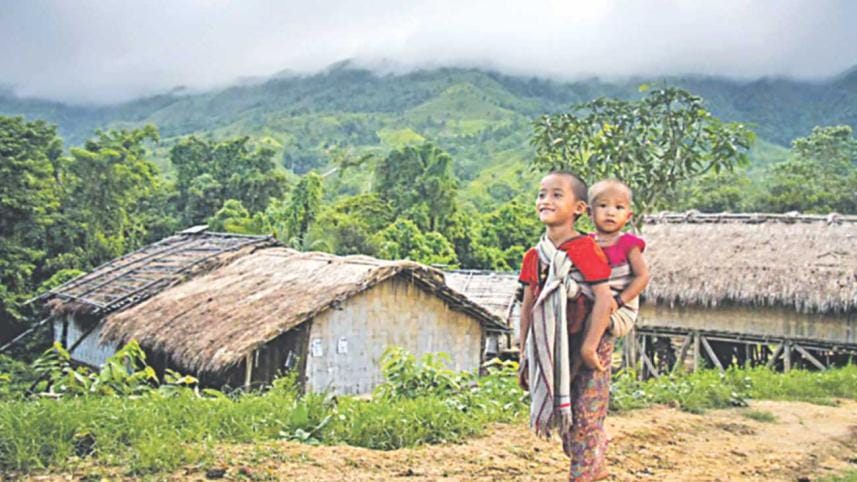Tribute to A Unique Mentor

It was literally a magical moment when Kuldip Nayar (Kuldip Ji to all who loved and admired him) first stepped into the newsroom of the newly launched The Daily Star. He loved the vibrancy that comes naturally when a bunch of young journalists embark on their dreamy journey to bring out the “best paper” of their life and he responded with all his latent energy that lay subdued ever since he left the newsroom and became one of the most renowned columnists of India.
He was a personal friend of our founder editor-publisher SM Ali (Ali Bhai to us all). So it was only natural that Ali Bhai sought the collaboration of his old friend and veteran journalist and editor while launching his own new venture, of which we all had the honour to be a part. Thus, Kuldip Ji's association with The Daily Star was practically from the very beginning.
I recall his first visit in mid-1992 when we were still in our Motijheel office. We bonded right from the word go. He seemed to thrive in the midst of this group of young, enthusiastic and committed journalists led by unquestionably the most internationally famed Bangladeshi journalist that Ali Bhai was. And we, for our part, were thrilled at the proximity of this famous journalist whose fame we had heard about but may not have been familiar with his writings, and who now stood with us, shoulder to shoulder, in our endeavour to give Bangladesh a quality newspaper as the country embarked on its new democratic journey.
As if it was his job to push us forward, he moved from one section to another starting with the newsroom, then to the editorial section, and then he met with the feature writers and came back to the newsroom where he stationed himself for days. His one key message to us was “accuracy” in news reporting. He repeated ad nauseam the need for it and said everything depended on it. A newspaper would never have any credibility, which is its lifeblood, without accuracy.
He devoted a lot of his time for us while spending the lunch and dinner hours with his friends, and I was privileged to be a part of the circle as the executive editor at the time. I was astounded by his energy and interest and later understood the reason for it. He had left the newsroom years ago when he retired from the editorship of Statesman and now, finding himself again in the hustle and bustle of what is the heart of any newspaper, he appeared to recall his old days and once again re-lived his newsroom days. And needless to say, we all benefited from it greatly.
Then disaster struck The Daily Star. We lost Ali Bhai in late 1993, within two and a half years of the paper's launching. Like many people, Kuldip Ji thought that this promising new daily faced an uncertain future. Like most people he also didn't know what this writer, and SM Ali's successor, would be able to deliver. And he decided to extend his experienced hand to a totally untried one, stunned by the loss of his editor and mentor and not knowing how to proceed.
Thus began a “Guru-Shishya” relationship between Kuldip Ji and me. On hearing the news of Ali Bhai's passing, he immediately called me, first of many to follow, and said, in a heavy and reassuring tone that was to be forever etched in my mind, “Do not lose heart; I will be at your side for whatever help you need.”
Other than my Board's unanimous and vigorous support for my editorship and my wife's unstinting faith in my ability to lead the newspaper, this phone call meant the world to me.
“Maahfooze [that is how he would pronounce my name], make sure to send me daily copies of your paper by post [internet wasn't available then] and I will send you my feedback. You may find them useful.”

And this he did, without fail, and needless to mention, I found them most educative. The copies would reach him seven to ten days later and he would read each edition and then call me. “Your lead story was not properly edited”, “The lead point was not developed enough”, “Why there was not any follow up of the earlier story”, “This story does not have enough facts” and so on.
Ever the editor, he never failed to praise whenever the occasion came about, knowing that my young team needed positive feedback as much as it needed guidance.
Thus we moved on, knowing that an experienced “gaze”, though from distance, was always upon us, ready to come to our aid whenever needed. More than anything else it gave us a sense of confidence and me a great sense of relief, knowing that we had the best possible guidance to move forward.
Over the years, he came to The Daily Star many times. He would never miss our anniversaries and took personal pride at the rising strength of the paper he felt was his own. Many of my colleagues he became familiar with and commented to me about the relative strength and weakness of their writing and guided me to help them. My senior colleagues did not know that many of the insightful things I told them actually came from him.
In the last few years, he appeared pained at the non-journalistic challenges that The Daily Star faced. Knowing, through his personal experience, the crucial role that independent media plays in a country's economic and democratic journey, especially the latter, he was disturbed at the impediments that were being laid to the progress of the former. As a most sincere friend of Bangladesh, he would rejoice at its every success and feel sad when reality indicated the opposite. He would often recount the damage that Indira Gandhi's emergency did to his country and how counterproductive media restrictions were for Mrs Gandhi's own future and would repeatedly plead through his columns that Bangladesh must never take that path.
On a personal level, I enjoyed an extraordinary level of affection from him. He took a personal pride in the success of The Daily Star and rejoiced at our ethical moorings and celebrated our refusal to deviate from them. He treated me like his son and called Shaheen, my wife, his “Bahu”. It would be impossible for both Shaheen and me not to see him and his wife, Bharati Ji, if we went to Delhi. And if for some reason we failed to, and if they came to know about it, we would never hear the end of it. Once I went for an angiogram and could not let them know. But somehow, they learned about it and called up the doctor to inquire how I was doing, and later gave me an earful for such negligence. It drove Shaheen and me to tears, realising how much they cared for us.
Once noticing that I was irregular in writing my column, Kuldip Ji, in a reprimanding tone, said to me, “Do you know that I have never missed my weekly column in the last 35 years? Once when I had my heart surgery I wrote four submissions in advance.”
True to his habit, he never ceased writing till the very end. His last column appeared on 14 August 2018, just a few days before he was taken to a hospital where he breathed his last on August 23 at the age of 95.
Journalism, South Asian relations, Bangladesh, India and Pakistan, in that order, were the topics of our discussion on every occasion we met, either in Delhi or in Dhaka. Courtesy Kuldip Ji I had the honour to meet many Indian politicians and media personalities. To every one of them he would ceaselessly talk about The Daily Star. He was immensely impressed by this paper's Board of Directors and would proudly say Indian owners should learn from them as to how to give editorial freedom and protect the institution of the editor.
He became very close to some of the directors, especially Latifur Rahman whose personal tragedies affected him deeply, but whose capacity to overcome them and continue to support independent journalism he admired from his heart.
We mourn the passing away of this giant in our field and take solace in the fact that he led a full life. May he rest in peace.

 For all latest news, follow The Daily Star's Google News channel.
For all latest news, follow The Daily Star's Google News channel.
Comments